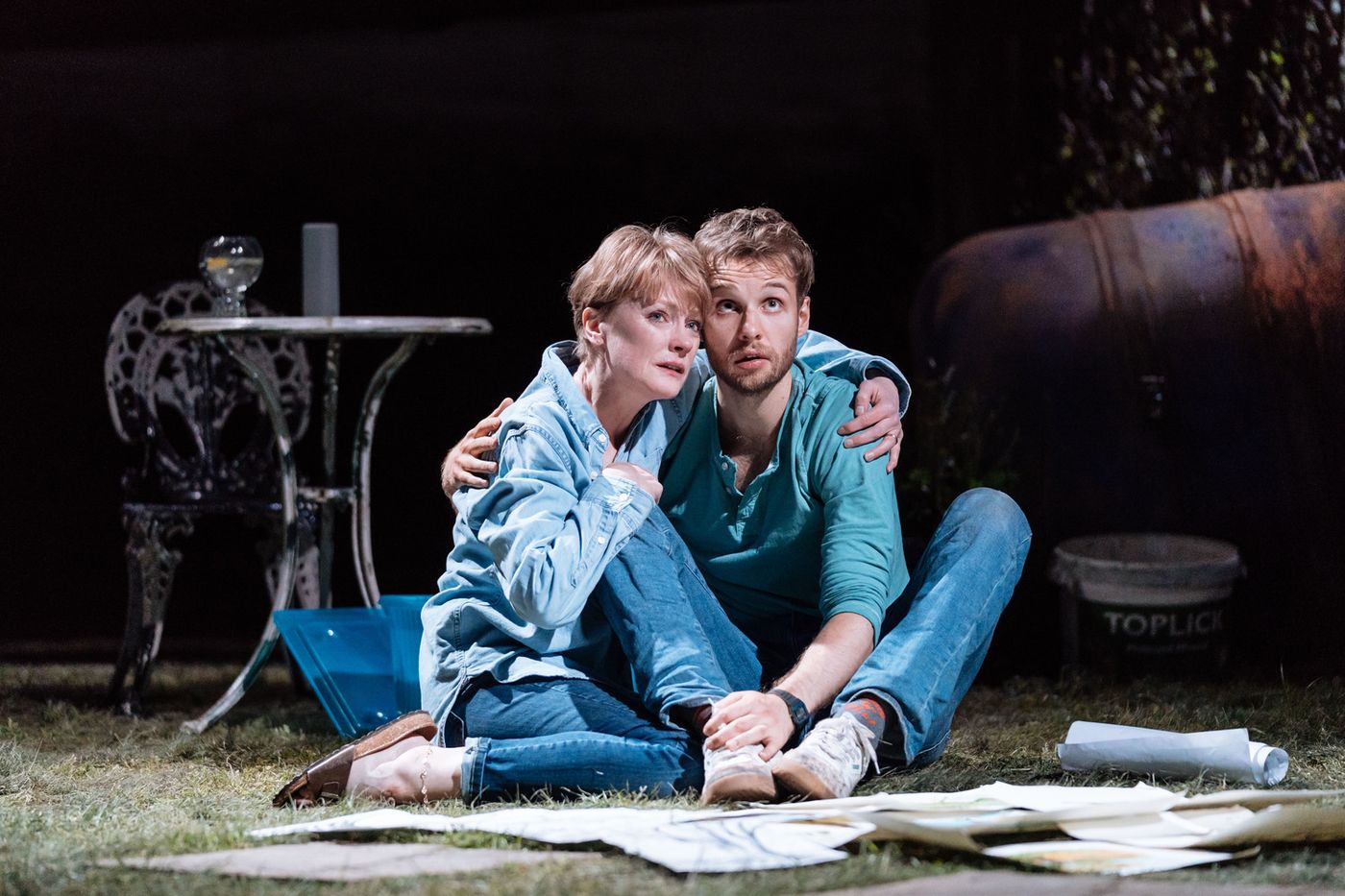Review: NIGHTFALL, Bridge Theatre

in Nightfall
![]() Part of the inaugural season at the Bridge Theatre, Laurie Sansom directs Nightfall. An exquisite exploration of grief, anxiety and change, Barney Norris' new play is an introspective character study and one which plays as such.
Part of the inaugural season at the Bridge Theatre, Laurie Sansom directs Nightfall. An exquisite exploration of grief, anxiety and change, Barney Norris' new play is an introspective character study and one which plays as such.
Following the death of her husband, Jenny surrounds herself with family at their farm in Hampshire. Her daughter Lou moves back in, and her son Ryan takes over the farm.
Here, Jenny is reminded of a golden time: the stump they played hide and seek behind reminds her of rose-tinted memories. Jenny believes she is continuing in the face of her grief. But for Lou and Ryan, they feel stuck. After all, "How do you make a future when you can't escape the past?"
Rae Smith's set reflects this state (or stasis) of things. The grass is unkempt, plants are overgrown, and rust collects. Time still moves on around them though. As night falls, the beckoning horizon changes between scenes, through projections from Chris Davey and Ian William Galloway.
The outside world does break through, and change comes in the form of industry. A large oil pipe spoils an otherwise green and pleasant land. A symbol of industry and town, it sits at odds with the farm and in particular Jenny. When Lou's ex-boyfried Pete returns with a plan in the pipeline to inject a bit of income, Jenny only sees it as something which will infect her life.
Norris' narrative deals with a number of themes, almost too many: town vs. country, Brexit, generational conflict, anxieties. Like the oil itself, though, the one which spreads across the play is grief, threatening to drown these characters. Norris' handling of grief is truthful to the point of hard-hitting, totally heartfelt and affecting.
Each character grieves differently: Jenny speaks to her late husband as if he's still there; Ryan wishes to speak to those he knew before his father's death; while Lou does not want to speak to anyone about it. This results in an issue which hangs over the play: a lack of dialogue.
One character notes that grief is like an island, and indeed these characters are isolated. Sansom's staging reaffirms this, an entrancing pattern as characters almost literally dance around each other and the issues at hand, as they move apart. But while this disconnect is crucial to their characterisation, it does impact the pacing.
These characters do not listen to one another or address their concerns, speaking mostly in overplayed pop-culture references. The first half of the play feels laboured, trying to unpack and failing to discuss, resulting in monologues with company.
Some sense of drama is created in the second half, thanks to not-so-subtly planted seeds about the mysterious Pete. These twists are somehow both predictable and yet entirely unbelievable, in what is an otherwise naturalistic story. A lot happens to these characters, but not a lot happens in this play.
Ophelia Lovibond is the anchor of this production. Though Lou may not be wholly assured in what she's doing or what she wants, Lovibond imbues her with a quiet confidence and real heart. It's impossible not to feel drawn to her. Sion Daniel Young's Ryan is exuberant and filled with energy but, like his sister, has nowhere to guide it.
Claire Skinner's Jenny feels somewhat of a stereotypical mother figure, though Skinner finds real agency when faced with change. Ukweli Roach is conflicting as Pete, though more so because of what he says rather than how Roach plays it. Calling out Jenny on her lifestyle and need to stay in this static world, I find it hard to believe they would have this interaction.
Change is what these characters so desperately need, otherwise as one of them warns, "The world will leave you behind". Needing some changes too, I fear the same could be true of Nightfall: left behind in the history of the Bridge Theatre.
Nightfall at the Bridge Theatre until 26 May
Photo credit: Manuel Harlan
Reader Reviews
Videos

